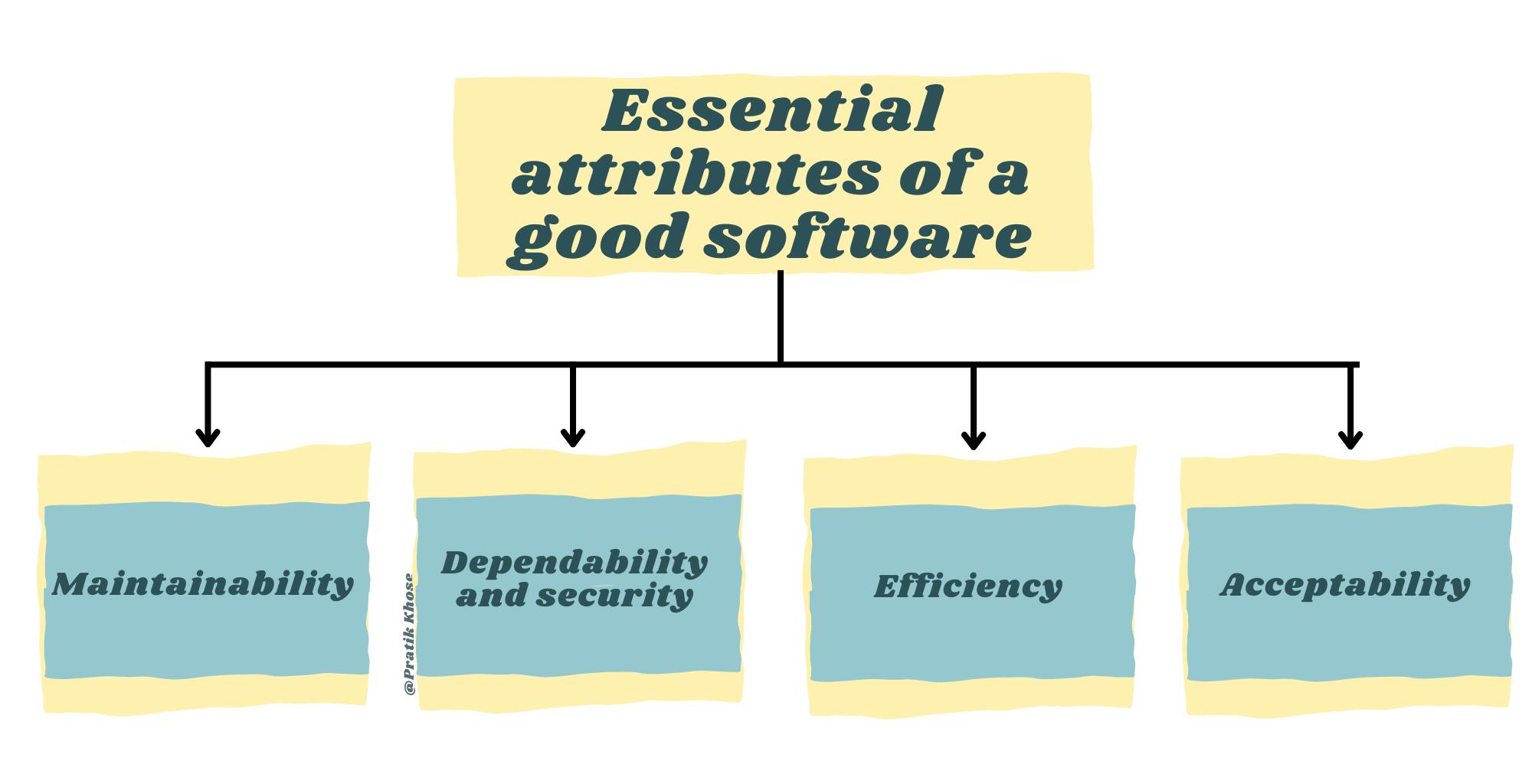Essential attributes of good software. There are mainly four essential attributes of good software-
Maintainability
Dependability and security
Efficiency
Acceptability

Now let us discuss each of them in detail.
1. Maintainability-
Software should be written in such a way so that it can evolve to meet the changing needs of customers this is a critical attribute because software changes and inevitable requirements often change the business environment. Professional software need to be maintained which means that it can be updated enhanced or fixed without excessive effort. It should have well-structured, readable code and proper documentation to facilitate ongoing development and troubleshooting.
- Example: Consider a web application built with a modular architecture and well-documented code. If a new feature needs to be added or a bug needs fixing, a maintainable system allows developers to identify and update the relevant modules without affecting the entire application. Good coding practices, clear documentation, and a modular design contribute to maintainability.
2. Dependability and security-
Dependable software should not cause any physical or economic damage in the event of system failure software independence includes a range of characteristics including reliability, security and safety. Miscellaneous users should not be able to access or damage the system. Security is critical for software that handles sensitive data or performs critical functions it should have appropriate security measures in place to protect against threats such as data breaches and unauthorised access. Software has to be secure so that miscellaneous users cannot access or damage the system.
- Example: An online banking application must be dependable to ensure the accuracy and security of financial transactions. If a user transfers money between accounts, the system must reliably update the balances, protect against errors, and ensure that the transaction history is accurate. Dependability is crucial in scenarios where the consequences of errors are significant.
3. Efficiency-
Software should not make wasteful use of system resources such as memory and processor cycles. Efficiency therefore includes responsiveness, processing time, memory utilisation etc. Software efficiency refers to the optimal use of system resources, such as processing power, memory, and network bandwidth. An efficient software system performs tasks quickly and with minimal resource consumption.
- Example: In a real-time gaming application, efficiency is crucial to providing a seamless and responsive user experience. The software should optimize graphics rendering, minimize latency in network communication, and utilize resources judiciously to prevent lag or delays during gameplay. Efficiency is especially important in applications where responsiveness directly impacts user satisfaction.
4. Acceptability-
Software must be acceptable to the type of users for which it is designed. This means that it must be understandable, usable and compatible with other systems that they use. Acceptability is about meeting user expectations and needs. A software system is considered acceptable if it aligns with user requirements, preferences, and usability standards.
- Example: A mobile messaging app must be acceptable to users in terms of its user interface, features, and performance. If the application is intuitive, offers a variety of communication options, and responds promptly to user inputs, it is likely to be well-received. Acceptability involves considering user feedback and continuously improving the software to meet evolving user expectations.
There are also other various important attributes of software which are-
5. Reliability- Software should be reliable and provide the expected remarks. Professional software should be dependable and free from critical errors and bugs. It must consistently provide accurate results and functions as expected under various conditions.
6. Scalability- Scalability is important for software that may need to handle increased loads or accommodate growing user bases. It should be able to scale up all down as needed without compromising performance. Software should handle increasing workload and it can be easily extended to meet the changing requirements according to the various conditions and situations a software goes through.
7. Ease of use - The software should be easy to use and understand. The user interface should be simple and straightforward. Making the software more complex and critical may affect the performance of the software as users may find it difficult to understand and work on the software.
8. Functionality- The software should perform its intended functions accurately and efficiently. It must meet the requirements and expectations of its users. The core feature should be reliable and user-friendly.
In summary, a good software system should possess these attributes collectively to ensure its effectiveness, reliability, and sustainability throughout its lifecycle. Each attribute plays a crucial role in delivering a high-quality and user-friendly software product.

